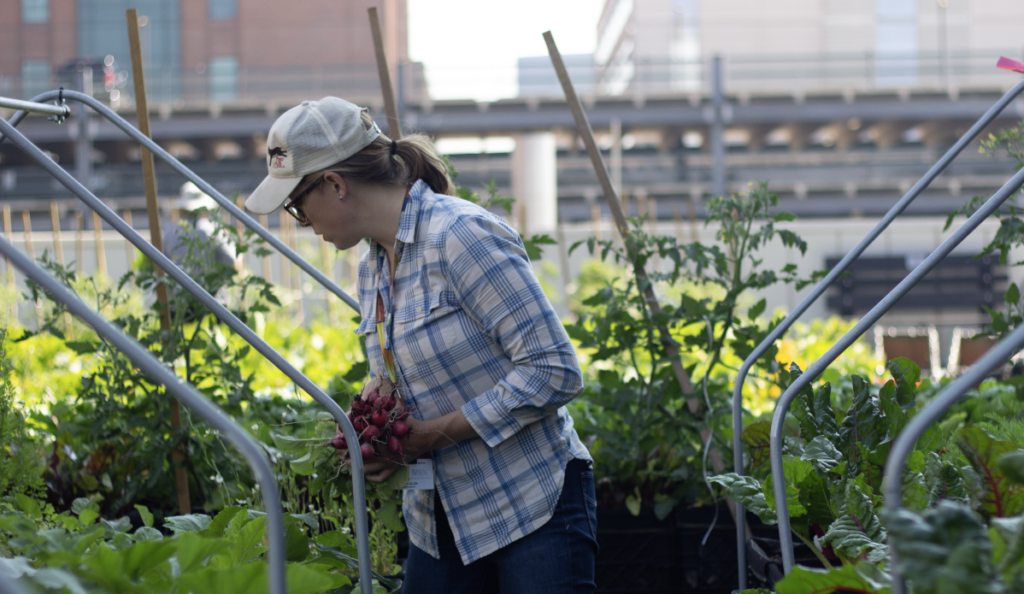Boston Medical Center is just as busy as any other health care facility, complete with wailing sirens and medical professionals, students, and anxious patients milling about. But the hospital’s power plant on Albany Street features a surprising spot of tranquility: a lush rooftop farm, sprawling at over 2,600 square feet, with peppers, radishes, and squash, among other crops. Managed by Higher Ground Farm, it provides fresh produce to the hospital’s kitchens. Spring is just around the corner and, come May, the farm’s growing season begins.
The idea behind Boston Medical Center’s farm follows in the footsteps of a general movement to change the quality of hospital food. An image of a tray with vague, flavorless broths, inedible gruel, crackers, and a particularly bright cup of Jell-O may come to mind when thinking of hospital meals. The effort to challenge this trope is gaining traction.

Photo by Sampada Nandyala
A couple years ago, the Northwell Health network hired Michelin-starred chef, Bruno Tison, to revamp food preparation at New York hospitals. Tison encouraged using better ingredients, enhancing culinary techniques, and serving meals to help patients feel at home. Last fall, he oversaw a cook-off between the chefs at 16 healthcare facilities. Dishes were judged on nutritional content, taste, and plating.
Boston Medical Center’s rooftop farm supplies the hospital’s Nourishing Our Community initiatives with fresh and local ingredients. The Preventive Food Pantry houses various food items that providers can prescribe to patients battling cancer, living with HIV, and managing diabetes. Patients are given up to two prescriptions per month, each meant to provide a family with a week’s worth of food.
“Boston Medical Center doesn’t want to be the only hospital doing this. I think this is a unique place that is able, and wants, to push the envelope in a lot of different ways. We want to be leaders.”
The pantry supplies kale, Swiss chard, bok choy, and collard greens from the farm. Dietician, Tracey Burg, holds classes at the hospital’s Teaching Kitchen, encouraging patients and their families to prepare meals they can enjoy while keeping illness in check. Last summer, the hospital also hosted a regular farmer’s market where everything was sold for a dollar.
Lindsay Allen manages more than 25 crops as well as on-site workshops for community members and patients. At the first workshop last summer, Allen taught the basics of gardening to participants. “A lot of the patients come out here through the Teaching Kitchen, so when [Tracey’s] hosting classes, she’ll bring them out here first to come out and see the harvest.”
Allen also supports summer camps at the farm, teaching both patients’ and employee’s kids. “They learn about farming and help me harvest. They get the food they’re going to cook, go back to cook the meal, and see it from harvest to actually eating the food.”
Boston Medical Center is not the only hospital to work closely with a local farm. Other health care centers in the country also source high-quality items for their kitchens, but the farms with which they partner are usually separate from the facility. When ingredients are grown on site, the hospital is often not in an urban setting.
According to Allen, many other hospitals have been reaching out to Higher Ground Farm, wanting to replicate the rooftop farm idea. “Boston Medical Center doesn’t want to be the only hospital doing this. I think this is a unique place that is able, and wants, to push the envelope in a lot of different ways. We want to be leaders,” she said.
The farm acts as a green roof, helping the hospital be more eco-friendly in its energy consumption as well. The farm works as both an insulating and cooling agent for the building, keeping costs for repairs and temperature adjustment low. Another way the farm maintains environmental sustainability is through careful water use, which Allen and other employees can control; they can manage crop watering with their smartphones.
“I try, whenever I’m farming, to think of how we create a full ecosystem here. We have both regular composting and worm composting,” Lindsay added. The rooftop is also home to bees, which pollinate the crops at the farm and other plants and flowers within a two-mile radius. “If I can provide a healthy home for the bees, then I think it’s my ethical duty to do so.”














